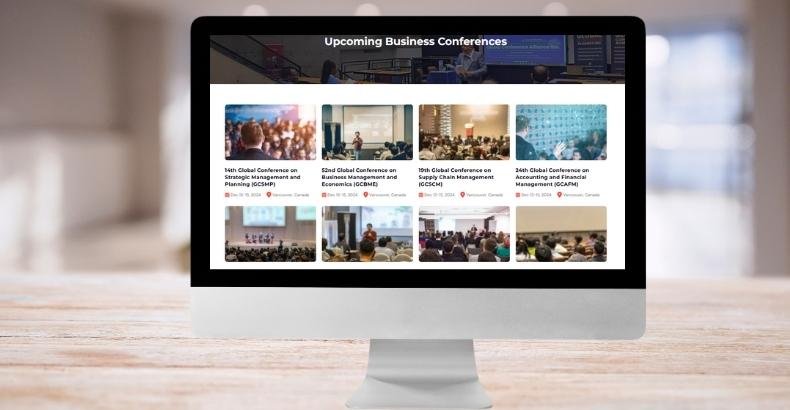Business conferences are exciting platforms where ideas come to life and opportunities flourish. Attendees step out of their routines to engage with like-minded professionals, share insights, and discover the latest trends in their industries. These events are a source of energy for innovation and collaboration.
So, what industries attend business conferences? The answer is diverse and captivating: technology, healthcare, finance, education, and marketing are just a few of the sectors represented. Each industry brings its distinctive flavor, contributing to a rich collection of knowledge and experience.
Want to learn more about how these industries benefit from conferences and the factors influencing their participation? Keep reading to find the exciting connections made at these influential events.
Importance of Business Conferences for Different Sectors
Business conferences play a very important role in various sectors, serving as a hub for innovation, networking, and industry insights. In sectors like technology, finance, healthcare, and education, these gatherings allow professionals to exchange knowledge, showcase new solutions, and discuss trends shaping their industries. This exchange of ideas fuels growth and helps sectors adapt to evolving market needs.

For businesses, conferences provide valuable opportunities to connect with potential clients, partners, and collaborators. Companies can use these events to boost brand awareness, learn about competitors, and stay informed about best practices. Attendees often leave with fresh perspectives and actionable strategies that benefit their organizations in the long term.
Those planning to attend the upcoming Canadian business conferences are particularly promising. Canada offers diverse events across major cities, addressing topics from digital innovation to sustainable practices. Attending these can be advantageous, providing exposure to global trends and invaluable connections within and beyond one’s industry.
What Industries Attend Business Conferences?
Being aware of which industries attend business conferences is vital to grasping their relevance. Business conferences attract professionals from nearly every sector. Let’s break down the key industries that are commonly represented at such events.

Technology and Software Development
Tech conferences are among the most popular, as this industry thrives on innovation and rapid change. These events often feature product launches, demonstrations, and discussions on emerging technologies like AI, blockchain, cybersecurity, and cloud computing. Software engineers, IT professionals, and tech entrepreneurs benefit from attending.
Healthcare and Pharmaceuticals
The healthcare industry relies heavily on business conferences to share research, clinical trials, and technological innovations. Conferences in this sector often focus on medical advancements, regulatory updates, and pharmaceutical developments. Attendees include healthcare providers, researchers, and pharmaceutical executives.
Finance and Banking
Finance conferences allow professionals to discuss topics like investment strategies, regulatory changes, and market trends. With the rapid digitalization of banking and finance, these events help professionals stay informed about fintech, blockchain, and digital currencies. Financial advisors, investment bankers, and regulators often attend these conferences.
Marketing and Advertising
This industry is continuously changing, making conferences a vital tool for learning about new trends, consumer behavior, and digital marketing strategies. Marketing professionals, agencies, and advertisers attend to stay updated on search engine optimization (SEO), social media trends, and brand-building techniques.
E-commerce and Retail
With the rise of online shopping, the e-commerce and retail sectors have found business conferences indispensable. These events cover logistics, customer experience, and digital transformation. Retailers, e-commerce platforms, and supply chain managers often attend to optimize their business strategies.
Education and Training
Conferences in the education sector focus on teaching methodologies, curriculum development, and technology integration in the classroom. These events help educators, administrators, and training professionals stay informed on the best practices in education and the latest tools available for both online and offline learning.
Manufacturing and Engineering
Business conferences in this sector cover advancements in automation, robotics, and production techniques. Professionals from manufacturing plants, automotive industries, and engineering firms attend to explore new tools and methods that can improve efficiency and reduce costs.
Hospitality and Tourism
Conferences for the hospitality and tourism sectors focus on emerging trends, customer experience, and marketing strategies. Hotel managers, travel agencies, and tourism boards frequently participate to discuss ways to adapt to changing consumer preferences and global market conditions.
Legal and Regulatory Sectors
Legal professionals attend conferences to stay updated on changes in legislation, regulatory policies, and emerging risks. These events provide valuable insights for lawyers, legal consultants, and compliance officers in industries that deal with legal issues regularly, such as finance, healthcare, and technology.
Environmental and Sustainability
With the global shift towards sustainability, conferences dedicated to environmental issues are gaining traction. Professionals from various industries, including renewable energy, waste management, and sustainable agriculture, attend these events to explore eco-friendly solutions and corporate responsibility strategies.
Virtually every industry can benefit from attending business conferences. The key is identifying the events that are relevant to your sector and your professional goals.
What Factors Influence Industry Participation in Conferences?
The decision to attend a business conference is influenced by various factors, some of which are specific to the industry and others that apply to all sectors.
Relevance of the Topic
Industries will only participate in conferences that offer relevant content. For example, an IT firm will not attend a conference focused on healthcare advancements unless there’s a clear connection, like healthcare technology.
Networking Opportunities
Industries value conferences that offer strong networking prospects. This could mean opportunities to meet potential clients, partners, or even competitors. In fact, networking opportunities at business conferences can significantly contribute to the overall value of attending. The larger the networking scope, the more likely a company will participate.
Cost and Accessibility
The financial and time investment required to attend conferences is a crucial factor. Industries often consider whether the cost of attending (including travel and accommodation) is justified by the benefits gained from participating.
Speakers and Expertise
Industries are drawn to conferences with renowned speakers, experts, or influencers in their field. The opportunity to hear from leaders and innovators can be a big incentive for participation.
Learning and Development Opportunities
Conferences that offer workshops, training sessions, or certifications tend to attract industries focused on professional development. These opportunities add tangible value to the experience.
Location and Timing
The geographical location and timing of the conference can also affect industry participation. A well-situated event during a convenient time of year will likely see higher attendance.
By analyzing these factors, industries can make informed decisions about which conferences to attend to maximize their return on investment.
How Do Industries Benefit from Attending Conferences?
Attending conferences can be an invaluable experience for professionals across various industries. These events are packed with opportunities to learn, network, and grow, providing attendees with valuable resources that can improve their careers and organizations. Here are several ways industries benefit from conferences.
Knowledge Acquisition
Conferences feature expert speakers and industry leaders who share insights on current trends, best practices, and innovative strategies. This knowledge can directly influence decision-making and strategic planning within organizations.
Networking Opportunities
Conferences are ideal venues for making connections. Professionals can meet potential clients, partners, and collaborators, promoting relationships that can lead to future business opportunities.
Exposure to New Ideas
Interacting with peers from different sectors allows attendees to discover new perspectives and approaches. This exposure can boost creativity and inspire new initiatives within their organizations.
Showcasing Innovations
Many conferences provide platforms for companies to showcase their latest products and services. This visibility can attract potential customers and increase brand awareness within the industry.
Professional Development
Attending workshops and training sessions at conferences helps professionals enhance their skills. This investment in personal growth can lead to career advancement and increased job satisfaction.
Market Intelligence
Conferences often highlight emerging trends and shifts in the market. Gaining insights into competitor strategies and industry changes can equip professionals with the knowledge needed to stay competitive.
Building Brand Reputation
Participating in conferences, especially as a speaker or sponsor, enhances a company’s reputation. Being recognized as an industry thought leader can significantly boost credibility and trust among customers.
Learning from Success Stories
Case studies presented at conferences offer real-world examples of success and failure. Learning from others’ experiences can help industries avoid common pitfalls and replicate successful strategies.
Engaging with Technology
Many conferences focus on the latest technological advancements. Engaging with new tools and software can improve efficiency and contribute to innovation within organizations.
Inspiration and Motivation
The energetic atmosphere of conferences can reignite passion and motivation among attendees. Hearing from industry leaders and innovators can inspire professionals to push boundaries and strive for excellence.
The benefits of attending conferences are vast and multifaceted, making them essential for industries aiming to thrive and innovate in today’s competitive market.
Networking Opportunities Across Various Industries
Networking is one of the most valuable aspects of attending business conferences. It’s a chance to meet new people, share ideas, and build connections that can lead to future opportunities. Whether you’re an experienced professional or just starting out, building a strong network is essential for growth and success.
Here are some key networking opportunities available across various industries:
- Industry-Specific Networking: Conferences often attract professionals from specific sectors, creating a focused environment to discuss common challenges and share best practices. This allows for deeper conversations and relationships to develop.
- Networking Sessions: Many conferences include dedicated networking sessions where attendees can mingle and connect. These informal settings often lead to meaningful conversations that may not happen in a more structured environment.
- Workshops and Breakout Sessions: Participating in workshops or breakout sessions encourages collaboration among attendees. Sharing experiences and brainstorming solutions can lead to new partnerships or ideas.
- Social Events and Receptions: Social events, such as cocktail receptions or dinners, provide a relaxed atmosphere for networking. Attendees can engage with industry leaders and peers in a less formal setting, allowing for authentic connections.
- Panel Discussions and Q&A Sessions: Engaging with speakers during panels provides an opportunity to connect with experts in the field. Asking questions or discussing insights can lead to further conversations after the session.
- Exhibition Halls: Many conferences feature exhibition areas where companies showcase their products or services. This setting allows for direct interactions with representatives, encouraging potential collaborations or partnerships.
- Online Networking Platforms: Some conferences offer online platforms where attendees can connect before and after the event. This ensures that networking can continue even after the conference has ended.
By taking advantage of these networking opportunities, professionals can expand their connections, gain new insights, and enhance their industry presence.
How to Choose the Right Business Conference for Your Industry?
Choosing the right business conference can feel overwhelming with so many options available. However, the right event can significantly impact your professional growth and networking opportunities. Here are the key points to help you manage the decision-making process and select the best conference for your industry.

Define Your Objectives
Start by outlining what you hope to achieve. Are you looking to network, learn about industry trends, or showcase your brand? Defining clear objectives will guide your selection process.
Research Conference Themes
Explore the themes and topics that the conference will cover. Ensure they align with your interests and professional needs; looking into the best conferences for entrepreneurs can be a helpful starting point. Attending a conference that addresses relevant issues will maximize the value you gain from it.
Review the Speaker Lineup
Check who will be speaking at the event. Are they recognized experts in your field? Learning from industry leaders can provide invaluable insights, so prioritize conferences featuring reputable speakers.
Assess Networking Opportunities
Consider the potential for networking at the conference. Look for events that promote interaction, such as workshops or roundtable discussions. Opportunities to connect with peers, mentors, and potential partners can be invaluable.
Review Previous Attendee Feedback
Look for reviews or testimonials from past attendees. This can provide insights into the overall experience and help you gauge whether the conference meets your expectations. Feedback from others can help you avoid events that fall short.
Consider Location and Timing
Ensure the conference location is convenient for you and that the timing fits your schedule. A well-timed and easily accessible event will encourage your participation and make it more enjoyable.
Check for Additional Resources
Some conferences offer workshops, training sessions, or resources that can improve your experience. Look for events that provide added value, such as access to educational materials or follow-up networking opportunities.
By considering these points, you can confidently choose the right business conference that aligns with your professional goals and industry needs.
Frequently Asked Questions (FAQs)
Before attending a business conference, it’s natural to have some questions. Below are some frequently asked questions that will help you to resolve any remaining issues.
What Industries Attend Business Conferences That Focus on Startups?
Industries such as technology, e-commerce, and finance are prominent attendees at startup-focused business conferences. These sectors participate to gain valuable insights into emerging trends, network with innovative entrepreneurs, and identify lucrative investment opportunities that can promote growth and development.
How Do Non-profit Organizations Benefit From Business Conferences?
Non-profit organizations attend business conferences to connect with sponsors, learn fundraising strategies, and engage with industry professionals. Conferences often offer sessions on financial management, marketing, and operational efficiency, equipping non-profits with skills to further their missions effectively.
Do Small Businesses Benefit From Attending Business Conferences?
Absolutely! Small businesses stand to gain a lot by attending business conferences. These events provide valuable exposure, essential knowledge, and critical networking opportunities, which can help them connect with potential partners, customers, and resources that contribute to their growth and success.
How Often Should Professionals Attend Business Conferences?
To stay informed about the latest industry trends and expand their networks, professionals should aim to attend business conferences at least once a year. For those in rapidly changing sectors, such as technology, attending more frequently can provide significant advantages and insights.
Are Government Agencies Interested in Attending Business Conferences?
Yes, government agencies often participate in business conferences to understand industry trends and engage in public-private partnerships. Attending these events enables them to gather insights that aid in policymaking and economic development. Additionally, agencies can connect with businesses that align with their regulatory or developmental goals.
Final Thoughts
As we’ve explored, business conferences are vibrant platforms where diverse industries come together to share knowledge and build connections. Knowing what industries attend business conferences reveals how vital these events are for professional growth and innovation. Each sector brings its unique insights, contributing to a rich diversity of ideas.
From technology and finance to healthcare and sustainability, every industry finds immense value in these events. Attendees leave with fresh perspectives and actionable strategies that can transform their businesses. It’s not just about learning; it’s about building relationships that last.
So, as you consider your next steps in professional development, remember the importance of engaging with these dynamic gatherings. They’re more than just conferences—they’re opportunities to shape the future of your industry.